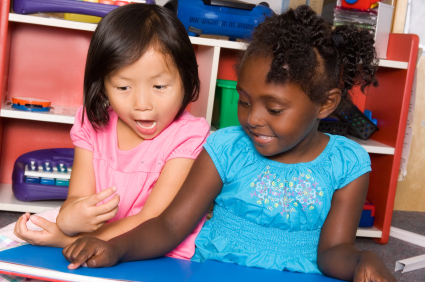 They're leaving babyhood behind; getting more social, and starting to learn that it's not all about them. Preschool is the perfect age to start talking about the importance of helping other people. A worthy goal -- but where to start? Social service programs rarely cater to this age group. But many preschools and daycares have found ways to engage young children in service work, while giving parents ideas on how to nurture generosity at home.
They're leaving babyhood behind; getting more social, and starting to learn that it's not all about them. Preschool is the perfect age to start talking about the importance of helping other people. A worthy goal -- but where to start? Social service programs rarely cater to this age group. But many preschools and daycares have found ways to engage young children in service work, while giving parents ideas on how to nurture generosity at home.
At Medina Montessori School, director Anne-Marie Ryan is always looking for ways to actively encourage her 2-to-5-year-old students to think about the needs of others. So, five years ago, when Northwest Harvest sent a flyer asking for help with a food drive, she came up with a simple yet engaging idea. She packed up her students (along with some parents) and took them to Whole Foods Market.
Using money normally earmarked for school field trips, the students went shopping. "The kids got their own small carts and looked for items from all five food groups," says Ryan. After the children gathered and paid for the food, they returned to school and handed their bags over to Northwest Harvest. That initial shopping trip was such a hit -- both with kids and parents -- that it is now an annual tradition. "The kids really understand that they are doing this for families who don't have enough money to get their own food," says Ryan.
The Country Dawn Preschool, on the border between Everett and Lake Stevens, has a year-round food drive, and participates each year in the Muscular Dystrophy Association's Hop-a-thon. Kids have sponsors who pledge money for each hop the child completes in one minute. Teachers incorporate information about muscular dystrophy into their curriculum so that the kids get a sense of what the Hop-a-thon is for. "I think it's important for them to see that there are differences out there, and that there are families in need," says Bliven. The kids respond with enthusiasm -- each year the school raises close to $2,000 for the organization.
For Katie Kehoe, a teacher at the Puyallup South Cooperative Preschool, the secret to engaging 3-5- year-olds in community service is helping them relate to the people they are serving. "We tell the kids, 'you know how you sometimes feel hungry? You can ask your mom or dad for something to eat, but some kids' parents can't always get them food,'" says Kehoe.
Kehoe finds that when the needs of others are presented in a way that kids can understand and connect with, they respond wholeheartedly. "Every November we do a big food drive -- we literally make a mountain of food," she says. Other popular service activities at the school include donating coins to the school's scholarship fund and bringing coats and blankets for families in need.
Laura van Dernoot Lipsky, founder and director of Prescolar Alice Francis, a Spanish language preschool in Seattle, agrees that preschool-aged children are very capable of empathizing with, and responding to, the needs of others. "Helping others comes naturally to kids," she says. "Our job is to help them stay connected to their inherent generosity." Van Dernoot Lipsky's school does this in a multitude of creative ways -- from handing out flowers to voters on Election Day, to writing heartfelt messages to Gulf Coast children displaced by Hurricane Katrina. "Even when we take field trips we are mindful about how we interact with others in the community, for example how we talk to the bus driver," she says.
Although school programs are a great place to start, parents of preschoolers can also find additional ways to cultivate generosity at home. One idea is to periodically give your child a box and ask them to fill it with toys or books they no longer want, explaining that they will be given to children who can't easily get their own. Bringing your child with you to drop the box at a community service organization or library can help your child feel connected to those on the receiving end of their generosity.
You can also bring your child to a community clean up, or have them help you prepare and bring food to people in need.
For van Dernoot Lipsky, it's all about trying to be the best person she can be, and modeling the values she wants her own children to have. (More on her work with her two preschool-aged children in "Creating a family spirit of giving.") "We don't realize how incredibly influential we are as parents," she says. "If we are generous ourselves, it helps our children remember that they are as well."
Lisette Austin contributes regularly to local publications. She lives in Seattle with her husband and 5-year-old son.









